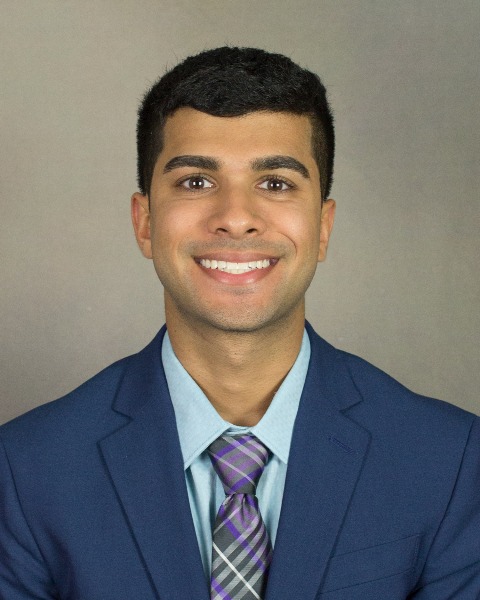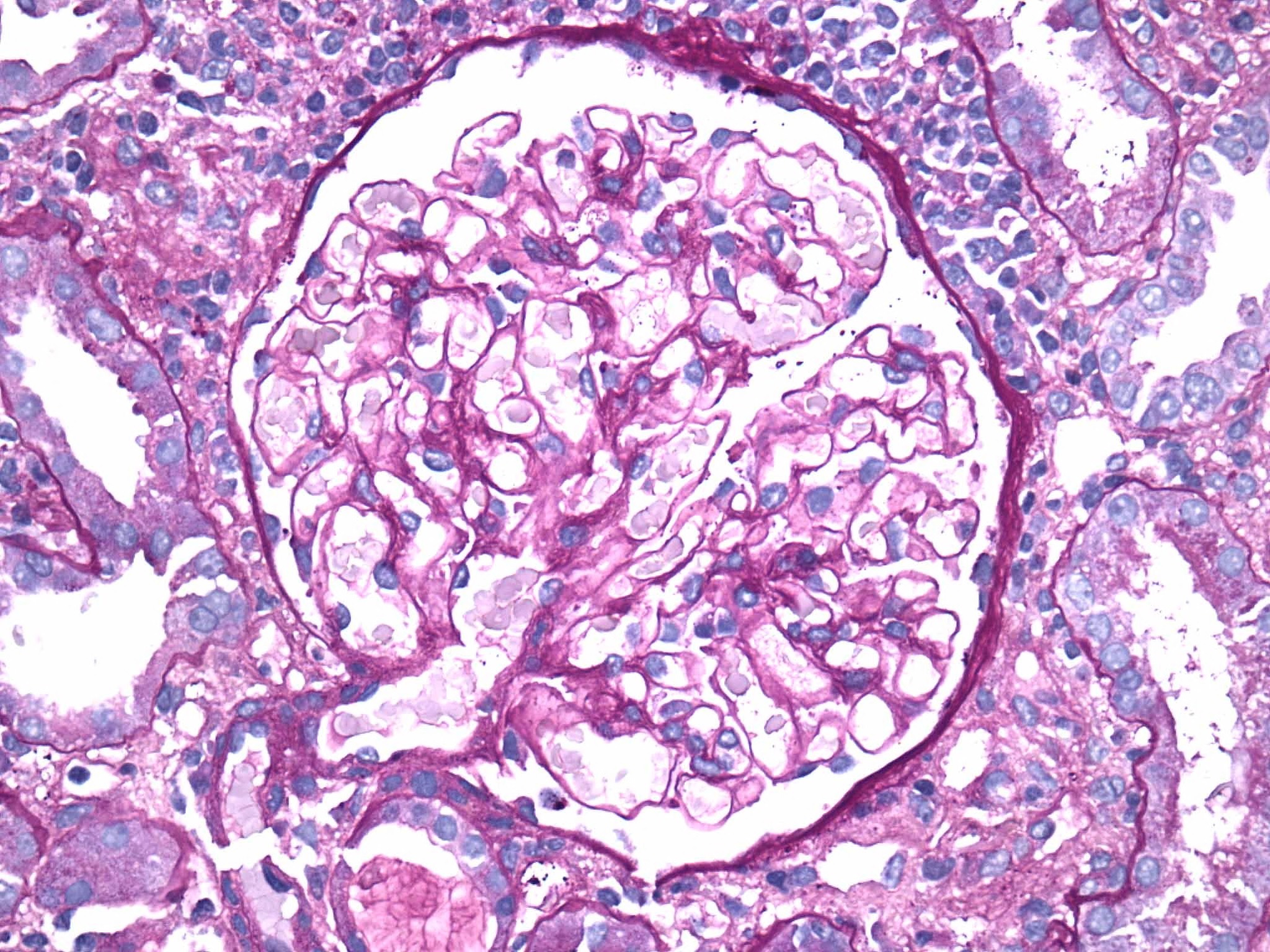Back


Poster Session B - Monday Morning
Category: Stomach
B0718 - A Cautionary Side of the Widely Prescribed: A Case of PPI-Induced AIN
Monday, October 24, 2022
10:00 AM – 12:00 PM ET
Location: Crown Ballroom

Has Audio

Neil Patel, DO
Lehigh Valley Health Network
Allentown, PA
Presenting Author(s)
Neil Patel, DO, Henry Lam, DO, Olga Vitorsky, DO, Michael Engels, MD
Lehigh Valley Health Network, Allentown, PA
Introduction: Proton pump inhibitors (PPIs) are widely prescribed for the treatment of gastric acid-related disorders. While generally well-tolerated, PPIs are not without side effects, including acute kidney injury. Here we highlight a rare case of biopsy proven PPI-induced acute interstitial nephritis (AIN).
Case Description/Methods: A 54-year-old male with history of rheumatoid arthritis presented with one week history of fever, fatigue, arthralgias, and weight loss. One month prior he was admitted with upper GI bleeding due to NSAID induced peptic ulcer disease and promptly stopped NSAIDs with strict adherence to PPI therapy. He took no additional medications or supplements. On admission labs were notable for recurrent anemia without melena and new acute kidney injury, creatinine 2.32 mg/dL from baseline of 1. Given recent GI bleed patient underwent repeat EGD which showed a clean based healing antral ulcer. Recurrent anemia was attributed to renal dysfunction, which continued to worsen despite supportive care with peak creatinine 3.8 mg/dL. Urine studies were unrevealing without evidence of obstruction on imaging, but incidentally noted narrowing of the celiac artery was concerning for vasculitis related nephropathy given history of autoimmune disease. Confirmatory contrast enhanced imaging however was negative for evidence of vasculitis with negative serologies. Renal biopsy was performed which showed interstitial inflammation and tubulitis consistent with AIN. Ultimate diagnosis of PPI-induced AIN was made as he took no alternative medications which could be implicated. Patient was started on steroids with notable improvement in renal function. He was switched to an H2 receptor blocker to complete treatment of gastric ulcer and discharged on a steroid taper with complete renal recovery.
Discussion: Initially described in 1992, PPI-induced AIN is a well-recognized albeit rare complication. It is thought to arise due to a hypersensitivity reaction, which may explain the classic presenting triad of fever, rash, and eosinophilia. However, studies have shown that this clinical triad is only present in 10% of cases thereby highlighting the difficulties of diagnosing AIN, which may ultimately require renal biopsy for definitive diagnosis. Treatment requires removal of the offending agent as well as initiation of steroids. Even with treatment, 30-70% of patients may develop chronic kidney disease. As such, it is important for clinicians to be cognizant of this potentially life altering complication of PPI.

Disclosures:
Neil Patel, DO, Henry Lam, DO, Olga Vitorsky, DO, Michael Engels, MD. B0718 - A Cautionary Side of the Widely Prescribed: A Case of PPI-Induced AIN, ACG 2022 Annual Scientific Meeting Abstracts. Charlotte, NC: American College of Gastroenterology.
Lehigh Valley Health Network, Allentown, PA
Introduction: Proton pump inhibitors (PPIs) are widely prescribed for the treatment of gastric acid-related disorders. While generally well-tolerated, PPIs are not without side effects, including acute kidney injury. Here we highlight a rare case of biopsy proven PPI-induced acute interstitial nephritis (AIN).
Case Description/Methods: A 54-year-old male with history of rheumatoid arthritis presented with one week history of fever, fatigue, arthralgias, and weight loss. One month prior he was admitted with upper GI bleeding due to NSAID induced peptic ulcer disease and promptly stopped NSAIDs with strict adherence to PPI therapy. He took no additional medications or supplements. On admission labs were notable for recurrent anemia without melena and new acute kidney injury, creatinine 2.32 mg/dL from baseline of 1. Given recent GI bleed patient underwent repeat EGD which showed a clean based healing antral ulcer. Recurrent anemia was attributed to renal dysfunction, which continued to worsen despite supportive care with peak creatinine 3.8 mg/dL. Urine studies were unrevealing without evidence of obstruction on imaging, but incidentally noted narrowing of the celiac artery was concerning for vasculitis related nephropathy given history of autoimmune disease. Confirmatory contrast enhanced imaging however was negative for evidence of vasculitis with negative serologies. Renal biopsy was performed which showed interstitial inflammation and tubulitis consistent with AIN. Ultimate diagnosis of PPI-induced AIN was made as he took no alternative medications which could be implicated. Patient was started on steroids with notable improvement in renal function. He was switched to an H2 receptor blocker to complete treatment of gastric ulcer and discharged on a steroid taper with complete renal recovery.
Discussion: Initially described in 1992, PPI-induced AIN is a well-recognized albeit rare complication. It is thought to arise due to a hypersensitivity reaction, which may explain the classic presenting triad of fever, rash, and eosinophilia. However, studies have shown that this clinical triad is only present in 10% of cases thereby highlighting the difficulties of diagnosing AIN, which may ultimately require renal biopsy for definitive diagnosis. Treatment requires removal of the offending agent as well as initiation of steroids. Even with treatment, 30-70% of patients may develop chronic kidney disease. As such, it is important for clinicians to be cognizant of this potentially life altering complication of PPI.

Figure: Kidney biopsy showing inflammatory changes predominantly in the interstitium.
Disclosures:
Neil Patel indicated no relevant financial relationships.
Henry Lam indicated no relevant financial relationships.
Olga Vitorsky indicated no relevant financial relationships.
Michael Engels indicated no relevant financial relationships.
Neil Patel, DO, Henry Lam, DO, Olga Vitorsky, DO, Michael Engels, MD. B0718 - A Cautionary Side of the Widely Prescribed: A Case of PPI-Induced AIN, ACG 2022 Annual Scientific Meeting Abstracts. Charlotte, NC: American College of Gastroenterology.
